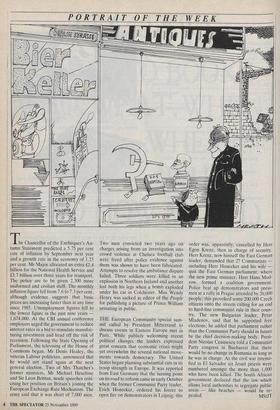PORTRAIT OF THE WEEK
he Chancellor of the Exchequer's Au- tumn Statement predicted a 5.75 per cent rate of inflation by September next year and a growth rate in the economy of 1.25 per cent. Mr Major allocated an extra £2.4 billion for the National Health Service and £3.7 billion over three years for transport. The police are to be given 2,300 more uniformed and civilian staff. The monthly inflation figure fell from 7.6 to 7.3 per cent, although evidence suggests that basic prices are increasing faster than at any time since 1985. Unemployment figures fell to the lowest figure in the past nine years 1,674,000. At the CBI annual conference employers urged the government to reduce interest rates in a bid to stimulate manufac- turing investment and head off the risk of recession. Following the State Opening of Parliament, the televising of the House of Commons began. Mr Denis Healey, the veteran Labour politician, announced that he would not stand again at the next general election. Two of Mrs Thatcher's former ministers, Mr Michael Heseltine and Sir Leon Brittan, made speeches criti- cising her position on Britain's joining the European Exchange Rate Mechanism. The army said that it was short of 7,000 men.
Two men convicted two years ago on charges arising from an investigation into crowd violence at Chelsea football club were freed after police evidence against them was shown, to have been fabricated. Attempts to resolve the ambulance dispute failed. Three soldiers were killed in an explosion in Northern Ireland and another lost both his legs when a bomb exploded under his car in Colchester. Miss Wendy Henry was sacked as editor of the People for publishing a picture of Prince William urinating in public.
THE European Community special sum- mit called by President Mitterrand to discuss events in Eastern Europe met in Paris. While publicly welcoming recent political changes the leaders expressed great concern that economic crises might yet overwhelm the several national move- ments towards democracy. The United States began planning substantial cuts in its troop strength in Europe. It was reported from East Germany that the turning point on its road to reform came in early October when the former Communist Party leader, Erich Honecker, ordered his forces to open fire on demonstrators in Leipzig; this
order was, apparently, cancelled by Herr Egon Krenz, then in charge of security. Herr Krenz, now himself the East German leader, demanded that 27 Communists including Herr Honecker and his, wife quit the East German parliament, where the new prime minister, Herr Hans Mod- row, formed a coalition government. Police beat up demonstrators and press- men at a rally in Prague attended by 20,000 people; this provoked some 200,000 Czech citizens onto the streets calling for an end to hard-line communist rule in their coun- try. The new Bulgarian leader, Petar Mladenov, said that he supported free elections; he added that parliament rather than the Communist Party should in future be the chief decision-making body. Presi- dent Nicolae Ceausescu told a Communist Party congress in Bucharest that there would be no change in Rumania as long as he was in charge. As the civil war intensi- fied in El Salvador six Jesuit priests were numbered amongst the more than 1,000 who have been killed. The South African government declared that the law which allows local authorities to segregate public areas — like beaches — would be re-










































































 Previous page
Previous page